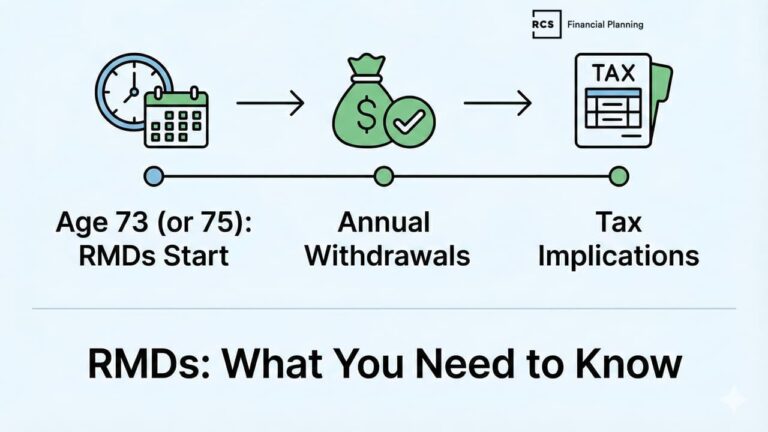Navigating IRMAA: How High-Income Retirees Can Manage Medicare Premium Surcharges in 2026
As a successful retiree or pre-retiree who has worked hard to build your wealth, you deserve to enjoy the fruits of your labor without unexpected Medicare costs eroding your retirement income. Yet many financially successful individuals are surprised when they discover that their Medicare premiums can be significantly higher due to IRMAA surcharges. This comprehensive guide will help you understand these surcharges and, more importantly, give you proven strategies to minimize their impact on your retirement lifestyle.
What is IRMAA and Why Should You Care?
Income-Related Monthly Adjustment Amount (IRMAA) is an additional premium surcharge applied to Medicare Part B and Part D for higher-income beneficiaries. While it affects only about 7% of Medicare recipients, the financial impact can be substantial—potentially adding thousands of dollars to your annual healthcare costs.
The complexity and seemingly arbitrary nature of IRMAA can create significant anxiety and frustration as you plan your retirement budget. After working diligently to secure your financial future, unexpected premium increases can feel like a penalty for your financial success.
Key Points About IRMAA That Often Surprise Retirees:
- It’s a “cliff” threshold – exceeding an income bracket by even $1 can trigger the full surcharge for that tier
- It uses a two-year lookback – your 2026 IRMAA is based on your 2024 tax return
- It considers both individual and joint filing statuses
- It’s reassessed annually based on your most recent tax return
- It can change suddenly due to one-time income events like property sales or large IRA withdrawals
How IRMAA Creates Financial Challenges for Retirees
IRMAA can significantly increase your Medicare expenses in several ways, creating challenges for even the most carefully planned retirement budgets:
Part B Premium Increases
The standard Medicare Part B premium for 2026 is $202.90 monthly. However, with IRMAA surcharges, you could pay up to $689.90 monthly—an additional $5,844 annually.
Part D Premium Surcharges
Beyond your regular prescription drug plan premium, IRMAA adds an extra charge ranging from $14.50 to $91.00 monthly, depending on your income bracket.
Impact on Medicare Advantage
If your Medicare Advantage plan includes Part D coverage, you’ll still face IRMAA surcharges, which are paid directly to Medicare, not to your plan provider.
Your Guide to Understanding and Managing IRMAA
At RCS Financial Planning, we’ve helped hundreds of retirees navigate the complexities of IRMAA and minimize its impact on their retirement income. Our team of fiduciary advisors understands both the technical aspects of IRMAA and the emotional stress these unexpected costs can create. With the right strategies, you can take control of your Medicare costs and protect your retirement savings.
IRMAA Brackets for 2026: A Comprehensive Breakdown
Understanding which bracket applies to you is the first step in developing an effective IRMAA management strategy. Here’s the current breakdown:
| MAGI (Single) | MAGI (Married Filing Jointly) | Part B Premium (2026) | Part D Premium (2026) |
|---|---|---|---|
| Up to $109,000 | Up to $218,000 | $202.90 | Plan premium |
| $109,001-$137,000 | $218,001-$274,000 | $284.10 | Plan premium + $14.50 |
| $137,001-$171,000 | $274,001-$342,000 | $405.80 | Plan premium + $37.50 |
| $171,001-$205,000 | $342,001-$410,000 | $527.50 | Plan premium + $60.40 |
| $205,001-$500,000 | $410,001-$750,000 | $649.20 | Plan premium + $83.30 |
| Above $500,001 | Above $750,001 | $689.90 | Plan premium + $91.00 |
Not sure if you’re missing anything in your retirement plan?
These 3 free checklists cover retirement planning, tax strategies, and important financial deadlines—so you can make informed decisions with confidence.
How IRMAA Is Calculated: Understanding the Process
To manage IRMAA effectively, you need to understand exactly how it’s determined:
- The Social Security Administration (SSA) obtains your tax return information from the IRS
- Your Modified Adjusted Gross Income (MAGI) is calculated by adding any tax-exempt interest income to your Adjusted Gross Income (AGI)
- Your MAGI is compared to the IRMAA income brackets for the current year
- If your MAGI exceeds the base threshold, you’re assigned to the corresponding IRMAA bracket
- The additional IRMAA amount is added to your standard Medicare Part B and Part D premiums
Example Scenario: The Real Cost of IRMAA
Let’s say you’re single, and your 2024 MAGI was $150,000. In 2026, this would mean:
- Your Part B premium would be $405.80 monthly (standard premium of $202.90 + IRMAA of $202.70)
- You’d pay an additional $37.50 monthly on top of your Part D plan premium
- Total annual IRMAA cost: $2,882.40 in additional Medicare premiums
For a married couple both on Medicare with a joint MAGI of $300,000, the annual IRMAA surcharge could exceed $5,764.
The Cost of Overlooking IRMAA
Without proper IRMAA planning, you could face:
- Up to $13,800+ in additional annual Medicare costs for a married couple
- Unexpected premium increases that disrupt your carefully planned retirement budget
- Compounding costs that erode your retirement savings over time
- Missed opportunities for legitimate income planning that could keep you in lower brackets
- Increased stress during retirement when you should be enjoying financial peace of mind
Your 3-Step Plan to Manage IRMAA Surcharges
Step 1: Understand Your IRMAA Exposure
- Determine which IRMAA bracket currently applies to you
- Project your future MAGI based on required distributions, Social Security, investment income, and other sources
- Identify potential income “cliff” years when you might exceed thresholds
Step 2: Implement Income Management Strategies
- Tax-Efficient Investing: Consider switching to tax-efficient funds or ETFs to reduce taxable distributions and implement tax-loss harvesting
- Qualified Charitable Distributions (QCDs): If you’re 70.5 or older, use QCDs to satisfy Required Minimum Distributions while reducing taxable income
- Strategic Roth Conversions: Convert traditional IRA assets to Roth IRAs in lower-income years to reduce future RMDs
- Income Smoothing: Plan major income events (like property sales or large IRA withdrawals) over multiple years to avoid MAGI spikes
Step 3: Monitor and Adjust Annually
- Review your strategy before year-end to make any necessary adjustments
- Prepare documentation for potential appeals if you experience qualifying life events
- Stay informed about threshold changes that might affect your bracket
- Work with a financial advisor who specializes in retirement income planning to refine your strategy
IRMAA Appeals Process: Your Recourse When Life Changes
You may qualify for an IRMAA reduction if you’ve experienced a life-changing event that significantly reduced your income. The SSA recognizes eight qualifying events:
- Marriage, divorce, or death of a spouse
- Loss of income-producing property due to a disaster or other event
- Loss of pension income
- Employer settlement payment
- Retirement or reduced work hours
- Loss of income from income-producing property
- Scheduled cessation, termination, or reorganization of an employer’s pension plan
- Closing or reorganization of a business you own
How to File an IRMAA Appeal:
- Complete Form SSA-44 (Medicare IRMAA Life Changing Event Form)
- Gather supporting documentation (tax returns, wage statements, etc.)
- Submit your appeal to the Social Security Administration
- For assistance, call 1-800-772-1213 (TTY: 1-800-325-0778)
The appeal process typically takes 2-3 months, but decisions can be retroactive if approved.
What Effective IRMAA Management Looks Like
With the right IRMAA strategy in place, you can:
- Make financial decisions with confidence, knowing how they’ll impact your Medicare costs
- Maintain greater control over your retirement income and expenses
- Potentially save thousands in Medicare premiums annually
- Enjoy greater peace of mind knowing you’ve optimized your healthcare costs
- Preserve more of your hard-earned savings for what matters most to you
- Pass more wealth to your heirs rather than paying it in premiums
Frequently Asked Questions About IRMAA
Looking Ahead: IRMAA in 2027 and Beyond
While exact figures for future years are not yet available, the structure of IRMAA is likely to remain similar, with slight threshold adjustments for inflation. As healthcare costs continue to rise, effective IRMAA management will become increasingly important for retirees.
The key to long-term success is developing a flexible, multi-year income strategy that anticipates potential threshold changes and adapts to your evolving retirement needs.
Key Takeaways
- IRMAA is a Medicare premium surcharge that affects approximately 7% of beneficiaries with higher incomes
- The surcharge is based on your MAGI from two years prior and can significantly increase both Part B and Part D premiums
- Even $1 over an income threshold can trigger hundreds or thousands in additional annual costs
- Proactive planning strategies like income smoothing, Roth conversions, and QCDs can help manage IRMAA
- If you experience a life-changing event that reduces your income, you may qualify for an IRMAA appeal
- Working with a financial advisor who specializes in retirement income planning can help you implement effective IRMAA management strategies
Expert Insights and Personalized IRMAA Guidance
At RCS Financial Planning, we specialize in helping retirees navigate the complexities of Medicare premiums and IRMAA surcharges. Our tailored approach includes:
- Comprehensive income projections and IRMAA threshold analysis
- Tax-efficient retirement withdrawal strategies
- Personalized IRMAA mitigation plans
- Assistance with appeals and documentation
Take Action Now
Don’t let unexpected Medicare costs disrupt your retirement plans. Schedule a consultation with our experts to create a strategy that optimizes your retirement income and minimizes your healthcare costs.
Remember, proactive planning is key to managing IRMAA surcharges effectively.
Ready for clarity and confidence in your Retirement plan?
30 minutes · No cost · No obligation
This material is provided for educational, general information, and illustration purposes only. You should always consult a financial, tax, or legal professional familiar with your unique circumstances before making any financial decisions. Nothing contained in the material constitutes tax advice, a recommendation for the purchase or sale of any security, or investment advisory services. This content is published by an SEC-registered investment adviser (RIA) and is intended to comply with Rule 206(4)-1 under the Investment Advisers Act of 1940. No statement in this article should be construed as an offer to buy or sell any security or digital asset. Past performance is not indicative of future results.






